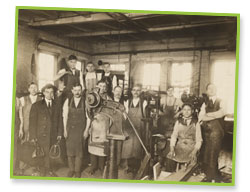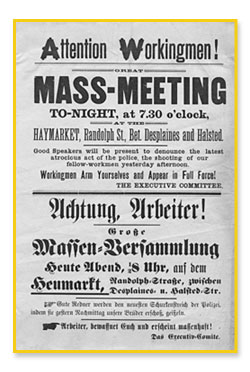His Father's Namesake
High School: Grades 9–12
Background Information
The Rise of the Labor Movement in Chicago
During the mid- to late 1800s, employers in Chicago maintained different wage scales and designated certain jobs within a factory for particular ethnic groups. At this time roughly two-thirds of Chicago factory workers were immigrants, and this management strategy was created to control workers and discourage their organization into unions.
Despite these measures, by 1870 the Socialist Labor Party, which grew out of the mostly German craft unions, was supported by a lively multilingual press and had elected five aldermen, three state representatives, and one state senator. The "Great Upheaval" of the mid-1880s saw unskilled Irish, German, and Polish workers band together to dramatically expand unionism among virtually all occupations. A major rallying point for labor activists was the movement for the eight-hour work day that centered in Chicago and had national and international consequences.
Source: The Electronic Encyclopedia of Chicago
The Haymarket Affair
Following a series of rallies for the eight-hour workday and a violent clash between workers and police at the McCormick Reaper Works, an outdoor protest meeting was organized for May 4, 1886. Organizers chose Haymarket (so named because a market building once stood there but was gone by the time of the protest) located on Randolph Street, west of Desplaines Street, a few blocks west of the south branch of the Chicago River, as the meeting site. The meeting was peaceful, but when Captain Ward ordered the crowd to disperse, a bomb suddenly flew through the air, killing one officer and setting off a riot during which 60 officers and an unknown number of civilians were wounded.
Chicago newspapers published unproven stories that anarchists were responsible for throwing the bomb. Eight anarchists were arrested, tried with no evidence, and convicted by jurors who acknowledged prejudice. Four of the convicted were hung, one reportedly committed suicide in his jail cell, and three were incarcerated. Less than 10 years after one of the worst miscarriages of justice in U.S. history, Governor Peter Altgeld pardoned the three surviving anarchists.
Source: The Dramas of Haymarket
Downloads (pdf)


